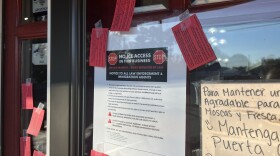Any other summer, a Saturday shift outside of a popular Durham brewery would mean reliable profits for Heladio Hernandez and his food truck, Holy Mole.
But on a recent afternoon at the tail end of this summer, there were only a handful of patrons outside Ponysaurus Brewing Company, and fewer customers lining up for enchiladas, flautas and tortas. The gloomy clouds hovering overhead definitely weren't helping either.
"We try to survive with breweries and places where we can park, whatever money we can make, that’s what we get. It's not the same after all of this pandemia (sic) started," Hernandez said.
The COVID-19 pandemic has distressed every sector of the restaurant business. According to data from the Department of Agriculture, U.S. consumer spending at food service establishments — such as restaurants, food trucks and school cafeterias — dropped dramatically during the early months of the pandemic.
We try to survive with breweries and places where we can park, whatever money we can make, that's what we get. It's not the same after all of this pandemia started. -Heladio Hernandez
In April, Americans spent $35.7 billion on food away from home, a more than 47% decrease compared to February, when that figure came in at $67.6 billion. That number recovered slightly in May, climbing to $48.5 billion, but restaurant spending remains much lower than usual.
The Triangle's bustling food truck scene has encountered distinct challenges. Though some trucks operate at consistent locations to pay the bills, many food trucks rely on large social gatherings for their biggest paydays. The near absence of large social gatherings over the past five months has ravaged the area's reported hundreds of trucks.
Hernandez said he knows of several businesses that have shut down entirely. Though he's not currently in the red, he said it's been a rough summer for both Holy Mole and Qspresso, a Cuban fusion truck.
"Last year, just for the summer, I think we did like $40,000 to $70,000," Hernandez said. "I've been in business for five years and it dropped a lot. Like this year, we (didn’t) even make half of the amount we made those previous years."
He's been counting on the return of college students, with several events scheduled at UNC-Chapel Hill and Duke University.
Now, those events seem unlikely. UNC-Chapel Hill officials scrambled this week to move undergraduate instruction fully online, after at least 130 students contracted COVID-19 by the end of semester's first week. Though Holy Mole's shifts haven't been canceled, Hernandez said they likely won’t be the same sort of economic opportunity.

"At the end of the day, you're like 'Ok, I made this much money, but I paid this much, so… I don't have money,'" he said. "But God always provides, so we have to keep working and keep doing what we're doing."
Some food trucks, such as Barone Meatball Company, have stayed afloat by reaching out into new markets and cutting expenses.
"We went from doing mostly lunches and a few dinners to doing as many neighborhoods as I could contact and we could start serving," Dewey said.
But it hasn't always been easy. In past years, Barone had multiple employees. Now, Dewey works with just one other person, Chardazha Miller. Together, they cover almost every shift - including the day we spoke, Dewey's 17th wedding anniversary.
"In a sense, I've saved money on less employees and me just working more, which has been a big change," Dewey said.
Despite the challenges, though, business rolls on for area food trucks.
At the outset of the pandemic, Andrea and Dwayne Cole were entering the final year of a five-year plan, with the end goal of opening an authentic Jamaican restaurant in downtown Durham.
Without sufficient funds to rent a brick and mortar location, the Coles decided to start with a food truck: Ama'Gees Jamaican Cuisine, which opened last August.
"It took off real fast. People loved the food, they loved the spice and they loved the vibes. So, everyone came out and supported the truck," Dwayne Cole said.
When the pandemic first hit, though, the Coles closed the truck for almost three months. But since reopening in late May, they said business has once again taken off.
They're still planning to open their takeout spot on Fayetteville Street in a few months.
"At some points in time, it seemed like it wasn't going to happen," Andrea Cole said. "But where we're from, we don't give up. And the same can be said for the people we have surrounding us."








